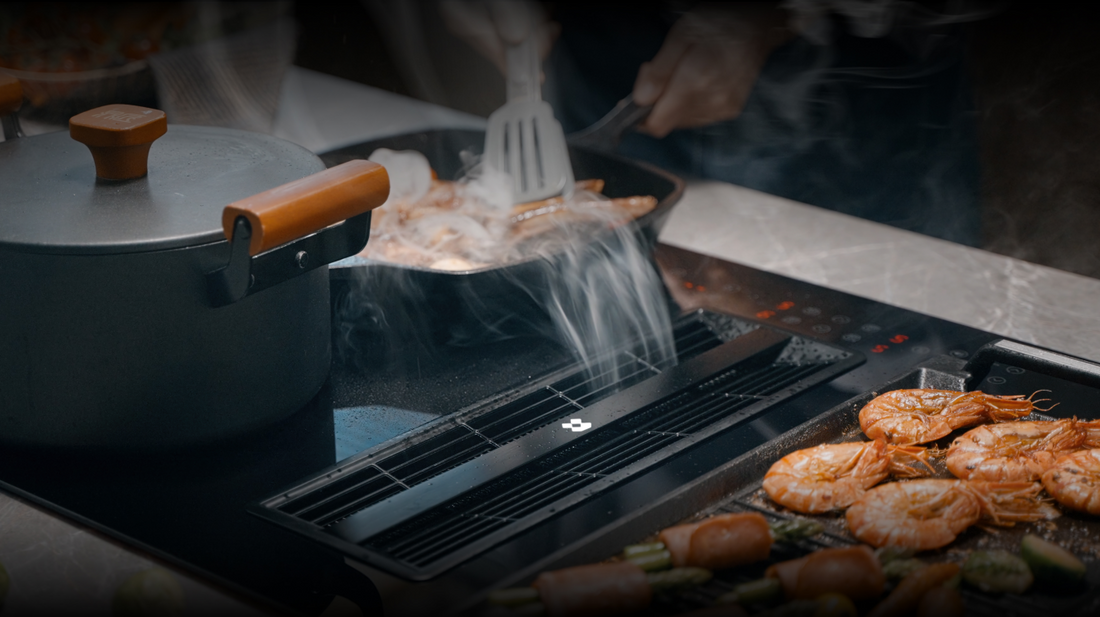Traditional cooktops often have overhead range hoods or ventilation systems for cooking odours, smoke, and grease. However, these traditional solutions may not be ideal for some kitchen layouts and designs. This is where downdraft cooktops step in. A downdraft stove top is a cooking appliance equipped with a built-in fan that draws in and expels fumes and smoke downward through a concealed channel beneath the floor rather than utilizing an overhead hood to capture these emissions. In contrast to the traditional setup with an extractor fan or cooking hood positioned above the stovetop, stove with downdraft vent operate by directing smoke, steam, and fumes through a duct and out through a vent located at a lower level.

Pros of Downdraft Cooktops:
Space Efficiency: One of the significant advantages of downdraft cooktops is their space-saving design. Unlike traditional overhead range hoods, downdraft systems are built directly into the cooktop, eliminating the need for a large hood that hangs from the ceiling. This can be especially beneficial in kitchens with limited space or in open-concept kitchen designs where a bulky hood might obstruct sightlines.
Clean Aesthetics: Downdraft cooktops offer a sleek and modern appearance. They provide a clean, unobtrusive look in the kitchen, making maintaining a minimalist or contemporary design style easier. This minimalist design can enhance the overall aesthetic of your kitchen.
Ventilation Flexibility: Downdraft systems are flexible in terms of installation. They can be placed on islands or peninsulas, allowing for more versatile kitchen layouts. Traditional range hoods, on the other hand, are typically mounted against a wall, limiting your kitchen's layout options.
Effective Ventilation: Modern downdraft systems have improved significantly in terms of ventilation efficiency. They can effectively capture and remove cooking odours, smoke, and grease from the cooking area. Some models even feature multiple fan speeds and powerful blowers for efficient air extraction.
Easy Cleaning: Another benefit of this cooktop style lies in its ease of maintenance. As fumes, smoke, and steam are drawn downward, there's no need to contend with residue buildup within a hood or extractor fan. Additionally, you'll only need to focus on cleaning a single area, eliminating the need to reach up with a step ladder to access the hood. Your cleaning routine simply involves cleaning the stovetop, much like you would with any other standard stove.
Cons of Downdraft Cooktops:
Less Effective than Overhead Hoods: While electric cooktop with downdraft have improved, they may still be less effective at capturing and removing cooking byproducts compared to traditional overhead range hoods. Downdraft vents rely on the principle of suction to pull air downward, which may not be as efficient as the upward flow of hot air in traditional hoods.
Installation Challenges: Installing a downdraft cooktop can be more complex and may require professional assistance, especially if it involves retrofitting into an existing kitchen. Proper ductwork and ventilation routing are essential for optimal performance.
Limited Options: Downdraft cooktops come in a more limited range of sizes and styles than traditional ones and hoods. This can limit your choices when it comes to selecting the specific features and aesthetics you desire for your kitchen.
Conclusion:
Downdraft cooktops offer a space-saving and aesthetically pleasing solution for kitchens, particularly when traditional range hoods are not feasible. However, they do come with some trade-offs, including potentially less effective ventilation and installation challenges. Choosing a cooktops with downdraft ventilation or a traditional range hood should be based on your kitchen layout, design preferences, and ventilation needs. It's essential to consider both the pros and cons to make an informed choice that best suits your culinary and aesthetic requirements.

